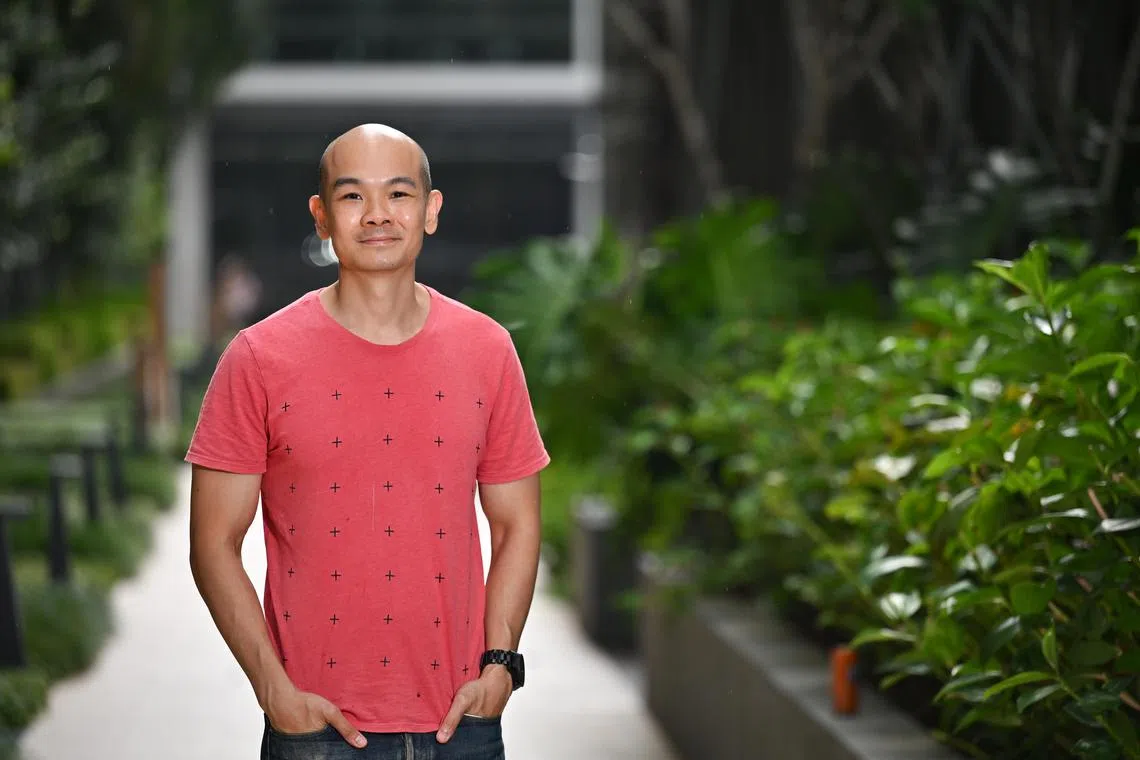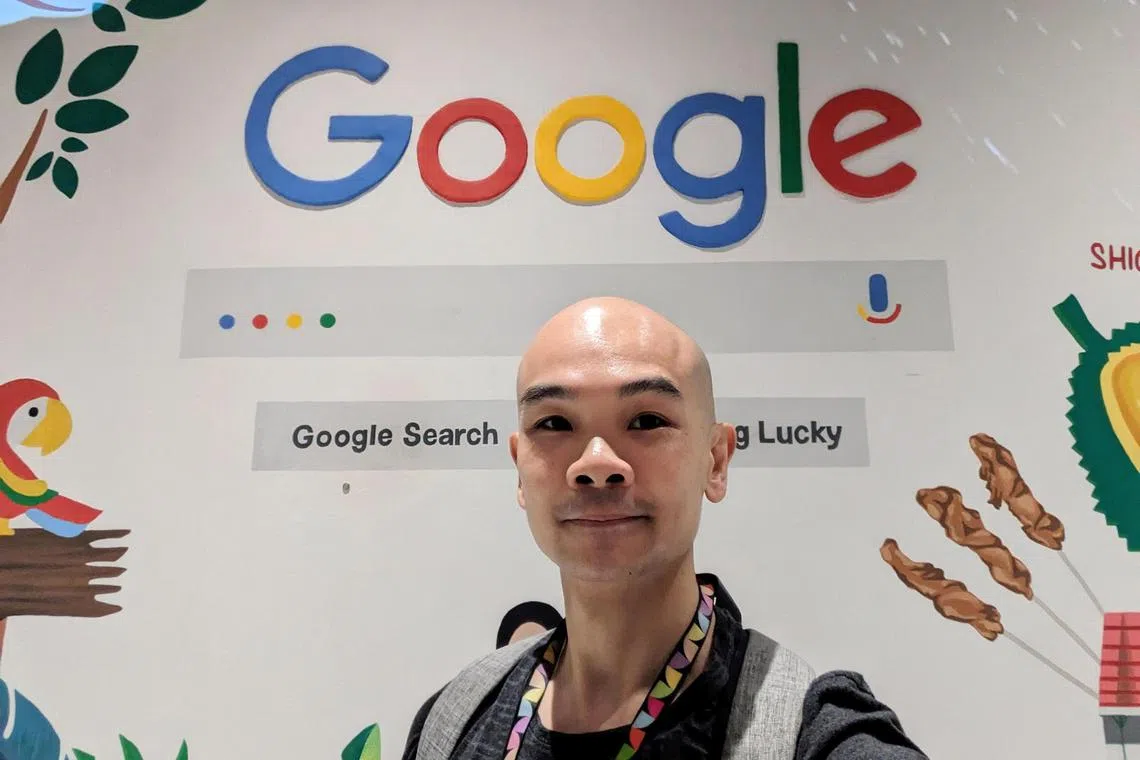Afterlife of finance bros: A mixed blessing to be pushed out of tech and finance industries
Sign up now: Get ST's newsletters delivered to your inbox

Mr Chen Shao Chun says his time in tech and finance taught him a lesson in knowing when to get out of the game.
ST PHOTO: LIM YAOHUI
Follow topic:
SINGAPORE – Mr Chen Shao Chun, 38, once held jobs that many of Singapore’s ambitious professionals would envy – stints at financial giants Merrill Lynch and JP Morgan, as well as seven years at tech company Google.
It was the wake-up call when his mother died in 2014 that prompted him to resign from the former, and a round of layoffs in 2024 that pushed him out of the latter.
Far from harbouring regrets, he views these departures as harsh but necessary nudges towards living a more fulfilling life.
Joining the world of finance was a no-brainer for him because of his tumultuous childhood.
“I grew up in a household with an unstable financial situation,” recalls the second child of a secretary mother and a father who ran a small magazine distribution business.
“When I was seven, I came home to my mum crying because creditors had put stickers on our belongings due to our debts. Seeing my mum cry and the collections company appraise everything in our home left a big mark on me.”
Determined not to experience such insecurity again, he majored in finance at Nanyang Technological University. Upon graduation, he secured his first job at Merrill Lynch (later acquired by Bank of America) before moving on to JP Morgan.
The gruelling hours and pressure-cooker environment were offset by outsized pay cheques. By the time he was 27, his annual salary as an investment analyst had hit $150,000.
In the competitive world of finance, Mr Chen says he and his fresh graduate peers measured their success by comparing their starting salaries – numbers which indicated their place in the finance bro pecking order.
Despite a growing realisation that the job was not aligned with his true interests – he was more interested in storytelling than analytics – he endured the “100-hour” work weeks and cold sandwich desk lunches to climb the corporate ladder.
One such opportunity came when he was asked to move to Hong Kong with Merrill Lynch. However, the realities of expatriate life were far from glamorous.
“In Hong Kong, I mostly just saw my serviced apartment, the office and the airport,” recalls the then-bachelor. Increasingly feeling burnt out, he returned to Singapore after six months in search of a more sustainable lifestyle closer to home.
His turning point came with an unexpected personal tragedy four years into his life in finance.
“As a graduate making six figures, it was a pretty big deal. I didn’t have time to take vacations, but I was able to send my mum on vacation anywhere she wanted,” he says.
“One day, I got a phone call from my dad that my mum had a heart attack while on holiday in China. I had only three days with her before she passed away. It was a pivotal moment that made me realise I paid for this holiday, but didn’t have the chance to really be there. The day after the funeral, I resigned.”

Mr Chen Shao Chun, pictured in New York during a corporate training event with JP Morgan, was a finance graduate whose decision to leave the sector was defined by an unexpected personal tragedy.
PHOTO: COURTESY OF CHEN SHAO CHUN
Friends and family urged him to reconsider and withdraw his resignation letter. Colleagues cautioned that he was making a rash decision.
Mr Chen went through with his resignation in 2014, and transitioned into the tech industry, where he accepted a sales analyst position at LinkedIn. It was a job that came with a 50 per cent pay cut, but offered newfound agency over his time.
It was a timely move because he entered the tech industry during its boom era, when big tech companies showered employees with free meals, well-equipped facilities and remote work benefits.
In 2016, he joined Google, his “dream employer”, where the perks extended beyond lifestyle benefits to include substantial compensation. Mr Chen calculates that at its peak, his annual earnings, including salary and equity, amounted to $350,000.

Mr Chen Shao Chun spent nearly eight years at Google before losing his job in a round of layoffs in 2024.
PHOTO: COURTESY OF CHEN SHAO CHUN
Leaving Google after nearly eight years was a bitter pill to swallow because, unlike leaving JP Morgan, it was not his choice. Mr Chen was part of a round of retrenchments in February 2024.
“When I was laid off, it was really tough for me. I thought I was loyal and had the most experience among the people on the team,” he says. “Those were quite sleepless nights I had.”
After gaining some distance from it, however, he says that in hindsight, it should have been obvious when parallels began to emerge between big tech and the finance sector.
After a pandemic-driven surge in growth, tech companies had to reckon with shrinking profits and a more hostile regulatory environment across the globe.
That meant a greater imperative for companies to do more with less. Meta founder Mark Zuckerberg announced in 2023 that the company was going through a “year of efficiency”, resulting in 20,000 layoffs that year. That same year, Google also slashed employee perks – such as lavish cafeteria offerings and massage services – to cut costs.
“Every industry goes through cycles. Tech people right now are very worried about layoffs and burnout,” Mr Chen observes of his former colleagues.
According to global industry tracker Layoffs.fyi, 2022 saw 165,269 employees laid off across 1,064 tech companies across the globe. That figure rose to 264,220 in 2023.
Today, Mr Chen wears multiple hats: adjunct lecturer at the National University of Singapore where he teaches marketing; YouTuber focusing on career fulfillment and personal finance; and maintaining his investment portfolio.
While his new path has meant a reduction in income, prudent investments and the equity accumulated during his time at Google have enabled him to fund his new lifestyle.
It contrasts sharply with that of his previous roles.
He says: “Day to day, I wake up, make breakfast, eat healthily, go to the gym or pool, turn on my laptop, start building up my YouTube channel, write scripts and prepare for my class every Thursday at NUS.”
Now married, Mr Chen lives in a rented condominium unit with his wife of two years. “You know that feeling on Monday mornings when you wake up and have Monday blues? I’ve forgotten how that feels.”
Looking back, Mr Chen says his life experiences have taught him valuable lessons about lifestyle inflation and the importance of knowing when to step off the treadmill.
His message has struck a chord with netizens. His YouTube video on the lessons learnt from his Google layoff has received over 320,000 views on the platform.
In his view, most seek out highly competitive roles in tech and finance because they want to achieve big financial goals: buy a house, help one’s parents retire or see the world.
In the process, however, most get so caught up getting to the next level that they never know when to stop. And their goals seem further and further away because the pressure to spend on things and experiences to signal their status to their peers rises, regardless of their actual value.
“I look back on my previous purchases, and it’s all for status and signalling. But if you’ve left your company and no longer need to prove yourself, there’s no need to signal.”
He adds: “The favourite phrase I got out of this entire experience is, sometimes in life, you don’t jump, you get pushed. I got pushed out of the finance industry because my mum died, and then layoffs pushed me out of the tech industry.”

